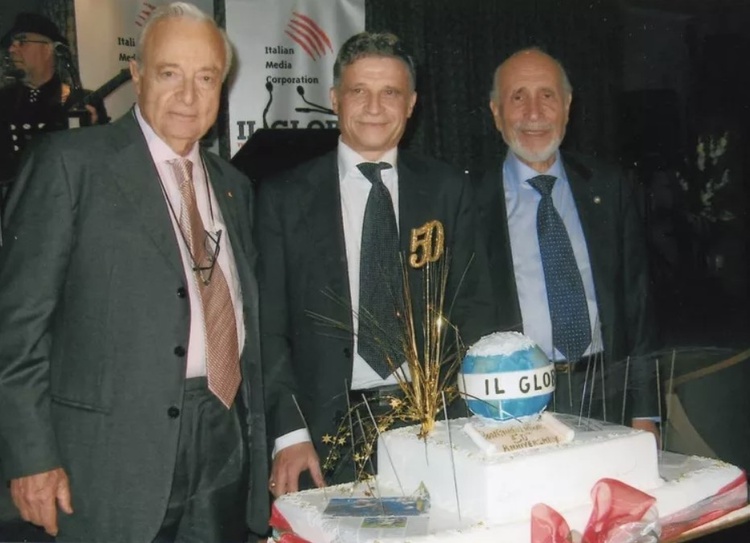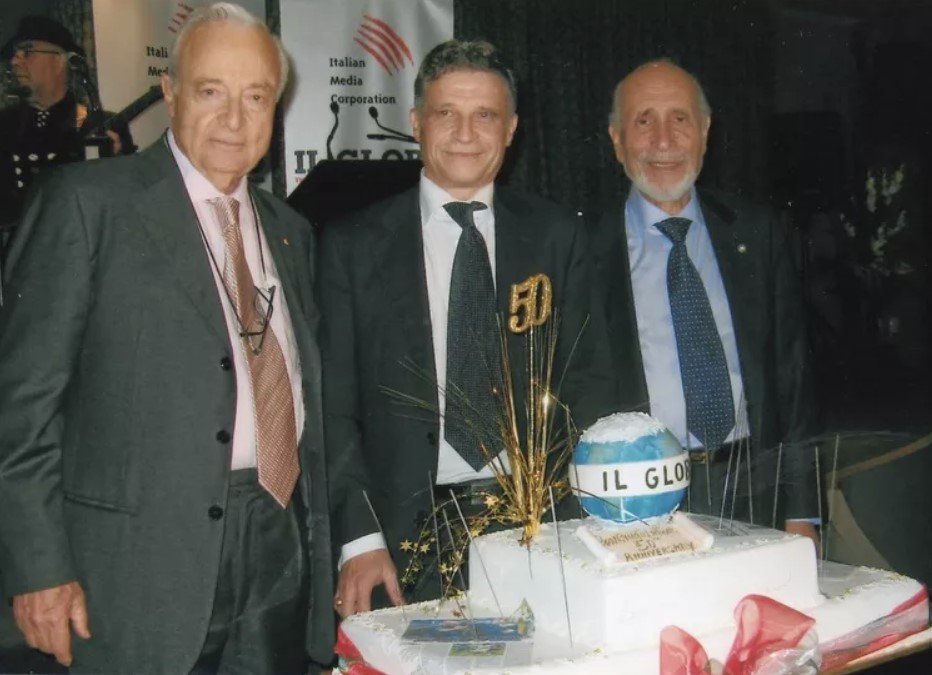“I got off the boat in Melbourne on October 18, 1957. I had a small suitcase with a few personal belongings and many dreams. Destination: Bonegilla. Two years later, on November 4, 1959, the first edition of Il Globo, the new weekly for Italians living in Australia, went to print in Melbourne and was distributed in every state in Australia. It bore my signature, Ubaldo Larobina, Founder and Editor.”
It has been 64 years since that first edition and exactly six since the last farewell editorial, written to announce Ubaldo’s decision to leave his post as director of the Italian Media Corporation, passing the role to his son, Julius. Today, our turn has come to write another farewell and thank you to Ubaldo, this time under the spell of heartbreak.
Born in Reggio Calabria on January 17, 1931, Ubaldo Larobina lived the majority of his ‘Italian’ life in Rome. His mother was a teacher and moved there for work. He grew up without a father from a very young age.
In the capital, Larobina initially studied law before allowing himself to be drawn to his true passion – journalism. The opportunity to start his career came through Il Tempo di Roma, but life’s circumstances once again pointed him in another direction, leading him to Australia in 1957.
Bonegilla, then factory work in Melbourne, because even in ‘lucky Australia’ nothing came for free. In 1959, the opportunity came for Larobina to pursue his dream when he got to pitch his idea to his friend, Tarcisio Valmorbida, already well established in the Italian business world in Australia. The proposal was met with a yes that got ‘Terry’ out of the family business to finance a new Italian-language newspaper.
In the last edition of 2017, Ubaldo Larobina farewelled and thanked the readers of Il Globo and La Fiamma, the listeners of Rete Italia and the Italian communities of Australia. Six years later, in the penultimate edition of the year from our newspapers, we extend a respectful farewell and a profound thank you to him.
A thank you that we feel we can say on behalf of all the Italians of Australia, a thank you that Australia should also say because Il Globo has contributed enormously to changing it. Italy too must be grateful to him, because through Il Globo it has always been proudly celebrated, defended when necessary, made better known and assisted in its ever increasing commercial and cultural integration in this country where, in part thanks to the newspaper, the Italian language and its teaching in schools has been kept alive.
For us, the most immediate task is to carry on with the same enthusiasm, devotion, professionalism and commitment that Ubaldo Larobina always displayed. He created something special from nothing, and gave the Italian community of Australia a reliable, safe and impartial travelling companion, a ‘friend’ of every Italian or lover of the Italian language.
Ubaldo Larobina had journalism in his blood and the community in his heart, as did all those who over the years made his dream possible.
His was a long journey in which he crossed paths with thousands of other lives, making an impact upon countless destinies and even indirectly on the history of multicultural Australia. I’m not exaggerating when I say he has my infinite personal admiration. I had the opportunity and the good fortune to spend a good part of my working life at his side and a small part of his incredible journalistic and human story also became my story, and I will be forever grateful to him for that.
The success of Il Globo was not accidental. The format of the product was perfect, the timing was right - then vision and hard work did the rest. The editor always kept, with the seriousness that characterised him, the commitments he made in his first editorial which we have repeatedly proposed to our readers ever since. We do so because it is the essence of what the newspaper wanted to be, and what it has succeeded in being. That is, the commitment to offer our readers a regular publication covering Italian, Australian and international news, as well as results and commentary on all sporting events. But above all, Il Globo has always had the ambition to bring the ‘village square’ to you, to circulate local information that directly interests the mass of our readers.
Larobina personally took on the responsibility of being the spokesperson for Italians in Australia, and in doing so during the years of the immigration boom in this country, the newspaper facilitated the formation of regional, provincial and village associations and clubs. The relationship with our public is the fundamental reason for our existence. Larobina believed “a newspaper for Italians abroad must not only provide information, but also constitute a link between the various realities of our communities”.
He always strived, during thousands of days in the editorial office and in the countless editorial meetings, to ensure that the Italian community continues to have a strong voice and recognised presence in print, radio and now also TV, in Australia. That is why he continued to follow every new project, every new initiative with interest, bypassing nostalgia and continuing to think about the future.
It is difficult to focus, still raw with emotion, on such a great loss - for his family before anyone else - but also for all those who worked with him. He was a constant presence, a safe point of reference and above all a genuine inspiration. He was an example for others, a teacher without ever lecturing, wise, discrete, respectful and a great communicator who took a lot of pride in the work we have chosen to do, while always having the utmost respect for those who read or listen to us.
In the special issue we prepared for the 60th anniversary of the newspaper’s foundation, Ubaldo Larobina, through clenched teeth because he never craved the spotlight, recounted some of his emotions. On this occasion, he let himself go with memories about “the long days in the editorial office, the nights in front of the typewriter, the ticking of the clock that brings closer the moment the newspaper goes to press. And then the endless discussions to choose the news - the smiles, the tension, the frustration, the pride of walking into the newsstand and looking at the front page - on which you had worked only a short time before - and standing there looking at it on the shelf for minutes. Nothing can convey all this to someone who has not experienced it firsthand.”
A life at the service of the Italian community that began behind a small desk in a small office on Sydney Road, Brunswick, with a small group of young journalists who were filled with the desire to explain this new country to their compatriots, as well as keeping them informed of and in touch with what they, often recently, left behind. Il Globo had quickly begun to accompany the lives of those within the Italian community, not only in Melbourne, but throughout Australia.
Ubaldo Larobina realised from the outset that before embarking on the adventure he had in mind, he had to prepare himself. So, a research trip through Victoria and New South Wales, together with Tarcisio Valmorbida, was gone on in order to get to know Italian communities outside the big cities. It was a journey to understand, listen and learn in order to to be able to give a community, which did not yet exist as a whole, the answers it was looking for and the things it needed. This journey was the starting point, the reason for making a newspaper able to talk to people, to give space to their stories, their traditions and their experiences that have become the guidelines and reasons for the success of Il Globo. One of the surest merits of Ubaldo Larobina was his ability to listen and carve out time to reflect before giving an answer. He was never hasty and never let himself be taken by impulse or negative emotions. Only the positive emotions counted in his life, and for this he earned - probably with few equals in the history of the Italian community – the highest respect.
He never made a decision without a precise reason, and never out of personal interest, but in the interest of the Italian community that shaped its own destiny and grew stronger day after day in its journey of perfect integration into Australian society. It did this without ever losing its uniqueness and its strong sense of belonging to Italy. It exemplified the multiculturalism of which Il Globo and La Fiamma have long been promoters.
With an ability to plan, wait and spare no effort to achieve his goals, the founder of this newspaper was able to grow and gain recognition and respect for the Italian community throughout the country.
Ubaldo Larobina has left us physically, but many splendid legacies remain, such as the very important one of teaching the Italian language in Australian schools. There has no doubt been different players in the field over the years to get to where we are now, but it is a fact of history that Il Globo in the 1970s campaigned for the teaching of Italian at a time when Australian politics still did not see the value. The campaign was full of passion and challenges, but in the end it was Il Globo that prevailed, leading the way for Italian schools and the teaching of the language in state schools. It was no small feat, for which Australia and Italy must be thankful.
In recognition of his extraordinary career, Ubaldo Larobina received several awards for his service to the community, for the promotion of the Italian language and for journalism. He was awarded the honours of Grande Ufficiale by the Italian government, as well as the Officer of the Most Excellent Order of the British Empire (OBE) and Officer of the Order of Australia (AO) by the Australian government.
As far as his personal life is concerned, I’ll leave it to the founding editor himself to close this editorial by reproposing his thoughts in his farewell article to the newspaper in 2017.
“Without a doubt, my most beautiful and most important contribution has been to give life to second, third and fourth generations who feel, appreciate and now also seek to rediscover and show their Italian origins.”
“Initiatives have appeared in recent years, and hopefully will continue to multiply in the future, to bring together professionals, businessmen and sportsmen of Italian origin who wish to meet, get to know each other, and possibly exchange contact details for future encounters. All these initiatives should be encouraged and supported. Similarly, the enrolment of young people in their parents’ clubs should be constantly encouraged, so that they can take possession of them after the death of the last original member for a better use of real estate that would otherwise disappear into the hands of speculators, as unfortunately has already happened.”
“Finally, allow me to remember my family. My wife Lindy, Australian by birth, Italian by adoption, who has been very close to me, allowing herself to be conquered by the Italian language, traditions and culture. And my three children: Nicoletta, Marco and Julius, who have given me seven wonderful grandchildren, all of whom are very proud of their strong ties with Italy.”












